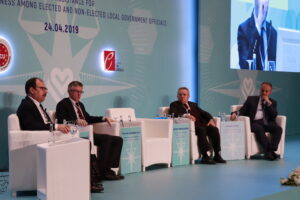
Technical Assistance for Implementation of Civil Society Dialogue and Civil Society Support Programmes (TR2015/DG/01/A5-01/001)
The overall aim of the project is to increase bilateral exchanges and cooperation between CSOs in Turkey and the EU at local, regional and national levels, to promote awareness raising initiatives on importance and benefits of membership of Turkey to the EU within Turkey and EU and on

Local Experts for Monitoring the Grant Contracts Being Implemented Under the Reproductive Health Programme
The financing agreement for the “Programme of Reproductive Health in Turkey” (RHP) was signed in December 2001 and started in January 2003. Within the context of the programme’s grant component, based on two calls for proposals, 88 projects were awarded a total value of €19.9 million. External assessors

Technical Assistance for Prevention of Corruption and Promotion of Ethics
Despite the OECD’s assessment that Turkey has made significant progress since 2007 in its efforts to combat corruption, the issue continues to represent an obstacle to economic and social progress and, potentially, to greater integration with the EU. The overall objective of the project was to contribute to

Technical Assistance for Result Oriented Monitoring in Turkey-Phase III
Within the scope of this project, we are aiming to ensure efficient and effective of IPA II assistance with a view to better achievement of the objectives set out in the Indicative Strategy Paper of Turkey (2014-2020) and assist NIPAC to fulfil his extended monitoring responsibility.

Technical Assistance for Gaziantep Regional Industrial Design and Modelling Centre (GETAM)
The Gaziantep region has great potential for several manufacturing areas; however, sometimes, it requires some support from well-qualified projects to achieve adequate results. Therefore, the overall objective of the project was to increase the competitiveness and economic welfare of the Gaziantep region. More specifically, it aimed to strengthen

Technical Assistance for Supporting the Solution of Economic and Social Integration Problems in Diyarbakır, Şanlıurfa, Gaziantep, and Erzurum, as Major In-Migrant Destinations
Rapid migration in major urban areas, namely Diyarbakır, Şanlıurfa, Gaziantep and Erzurum (DGES), have adverse impacts in Turkey. To reduce these unfavourable effects, EKOSEP aimed to support social integration and environment-related infrastructure problems due to migration in the selected provinces in a multi-actor manner. Furthermore, it aimed to

